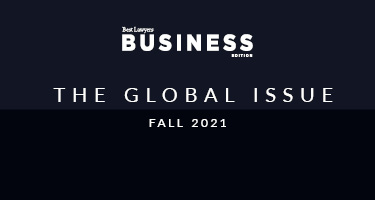Not long ago, corporate leaders everywhere followed an implicit rule when it came to hot-button social issues: Better silent than sorry. Any public stance, they reasoned, would alienate some segment of employees, customers, or investors. Better to stay quiet and focus on making money.
All that has changed, however, as polarizing debates over gun control, immigration, climate change, transgender rights, and gender parity have come to dominate the national conversation. Fueled by younger staffers and consumers’ demand to know where companies stand, CEOs at behemoths as disparate as Ford Motor Company, Dick’s Sporting Goods, Salesforce, and Merck have released public statements regarding a variety of issues. Though the spike in so-called CEO activism has coincided with Donald Trump’s presidency, observers of the space say it has been ongoing for years.
“It’s a pre-Trump phenomenon,” says Doug Chia, executive director of the Governance Center for The Conference Board, a Chicago-based think tank dedicated to corporate issues. “Before Trump, we saw some companies taking very strong stances when state laws were discriminatory against LGBT individuals.” Indeed, dozens of companies—including Facebook, Apple, and Bank of America—publicly decried or threatened to pull business out of North Carolina after the state passed a law in early 2016 that restricted cities’ ability to pass anti-discrimination ordinances. Since then, CEOs have taken ever-more-frequent public-policy stands. The Supreme Court recognized companies’ right to do so in the 2010 case Citizens United v. Federal Election Commission, when it ruled that the government may not prevent corporations or unions from spending money on political support.
“There’s no question that companies have the right to speak out,” says Don Mayer, a professor of business ethics and legal studies at the University of Denver. “The question is, when is it the right thing to speak out, and on what issues?”
Legal perspective on that query is mixed, he says. Some firmly believe that public companies “belong” to their shareholders and, as such, must focus entirely on creating shareholder wealth. Any action or public comment that puts that wealth at risk could be viewed as a breach of fiduciary duty that might lead to legal action in civil court.
But the idea of shareholder primacy has been challenged, most notably by Lynn Stout, a professor at Cornell Law School who passed away in April. “Contrary to what many believe, U.S. corporate law does not impose any enforceable legal duty on corporate directors or executives of public corporations to maximize profits or share price,” she wrote in a 2012 post on Harvard Law School’s Forum on Corporate Governance and Financial Regulation. In her book The Shareholder Value Myth, Stout argued that the pursuit of profits above all is a stale idea that mistakenly pits the interests of shareholders against those of society. Instead, she wrote, new legal and economic frameworks demonstrate “better, more sophisticated, and more useful understandings of the role of public corporations and of good corporate governance” that go far beyond propping up the stock price in the short term.
Even if shareholder value is championed, examples of CEO activism show that considered comments rarely hurt a firm financially. Apple CEO Tim Cook, an early activist who spoke out publicly against laws allowing individuals to invoke their religious beliefs to refuse service to others, has watched his company’s stock nearly double in the last two years. His belief that no one should be allowed to discriminate against gays and lesbians has been well-received by Apple employees in the liberal stronghold of Silicon Valley. Moreover, Apple’s market position is strong enough that Cook’s comments don’t stop conservatives from buying iPhones and Macs.
Research conducted by Aaron Chatterji, an associate professor at Duke University, and Michael Toffel, a professor at Harvard Business School, underscores this point. Through a market-research firm, the pair asked more than 2,100 people how likely they were to buy Apple products. Some were told about Cook’s stand against discrimination; others weren’t. They found that those who were informed of the CEO’s stance were more likely to buy something—largely because customers who already agreed with Cook reacted well. CEOs don’t have a strong ability to change people’s minds on social issues, Chatterji and Toffel found, but they’re quite able to increase affinity among like-minded customers.
No to “No Comment”
As lawyers and academics ponder the implications of CEOs’ social stances, many advisors believe executives have no choice but to put forth a well-defined position that aligns with the view of the board and major stakeholders.
“The easiest thing for all lawyers to do is say ‘no’: No, the CEO should not comment on anything with a remotely social angle,” Chia says. “But there are countervailing pressures from customers, employees, and shareholders who are saying, ‘Those days are over, and we’re not going to let you get away with a ‘no comment.’ ” The rapidly evolving voice of corporate America represents two distinct changes in the business world, he adds: First, the enduring link between pro-business economic values and socially conservative ones has unraveled rapidly as tech companies largely populated by millennials have grown in prominence. Second, companies and brands have assumed such a powerful role in people’s lives that customers, especially millennials, look to give their business to companies aligned with their own political and social beliefs.
As a result, many corporations have ditched the decades-old avoidance strategy and gone on the offensive. More than half of S&P 500 companies today have a special board committee to advise on social-responsibility issues, versus just 12 percent in 1990, according to research by Mary-Hunter McDonnell, a management professor at the University of Pennsylvania’s Wharton School. Her research finds that corporate-sponsored activism significantly lowers the number of challenges brought against it by outside social activists. In other words, CEO activism can effectively shut down the threat of contentious third-party campaigns by aligning the company with activist allies.
Another advantage of going public with social stances: Entering the spotlight enables executives to feel that they’re placing themselves and their firm “on the right side of history,” Chia says.
One example: As the #MeToo movement has ushered gender issues to the national fore, some companies have agreed to publicly address the persistent chasm between male and female pay. Jewelle Bickford, a New York–based partner at Evercore Wealth Management, cofounded Paradigm for Parity, a high-powered group of business leaders who pledge to close the gap by 2030. Major companies including Accenture, Bank of America, and Walmart have joined Paradigm for Parity’s coalition, which promises to implement five-point action plan that will help them achieve gender parity within the next 12 years.
Executives stand to doubly benefit by going public in favor of gender parity, as exemplified by Marc Benioff, CEO of tech firm Salesforce, who told his story on 60 Minutes. “Marc sort of personified most well-meaning CEOs [in that he] found it hard to contemplate he has a wage gap at his company,” Bickford says. “But he committed to actually measuring it, and then he committed very publicly to reconciling it.”
Salesforce has since spent $8 million to equalize its employees’ pay; Benioff and the company have received a deluge of positive press as a result. Salesforce also stands to benefit financially if women are equally paid and promoted into leadership roles, according to Bickford, who cites research from Credit Suisse that companies with senior operating roles filled at least half by women produce returns on equity that are, on average, 19 percent better than those dominated by males. Indeed, Leslie Gaines-Ross, chief reputation strategist at PR giant Weber Shandwick, says authentic, thoughtful CEO stances are among the best ways to improve business as younger people enter the workforce and become serious consumers. “For companies looking to attract millennials in terms of sales, recruitment, and increasing word of mouth,” she says, “CEO activism is hard to overlook.”















